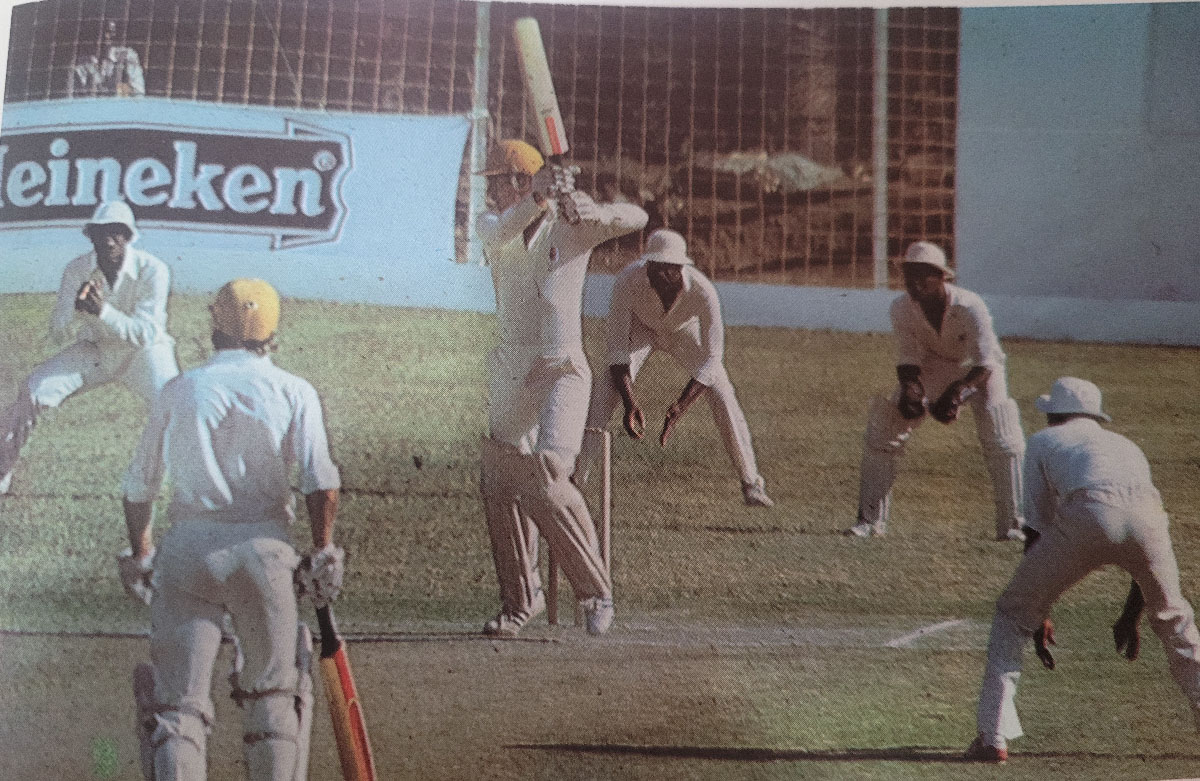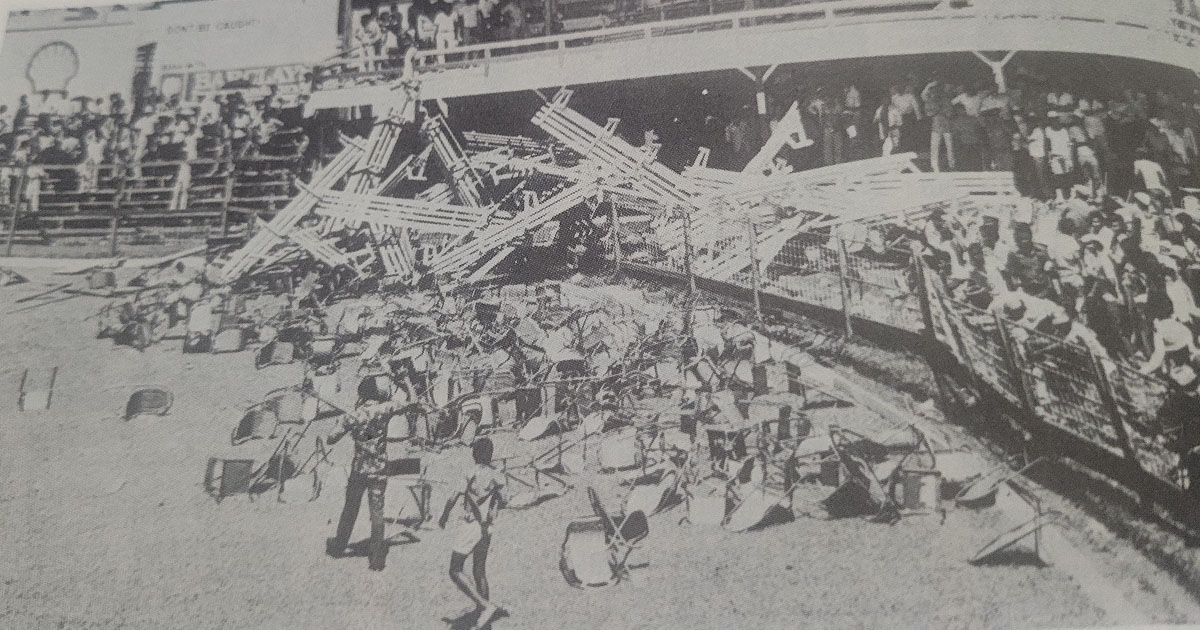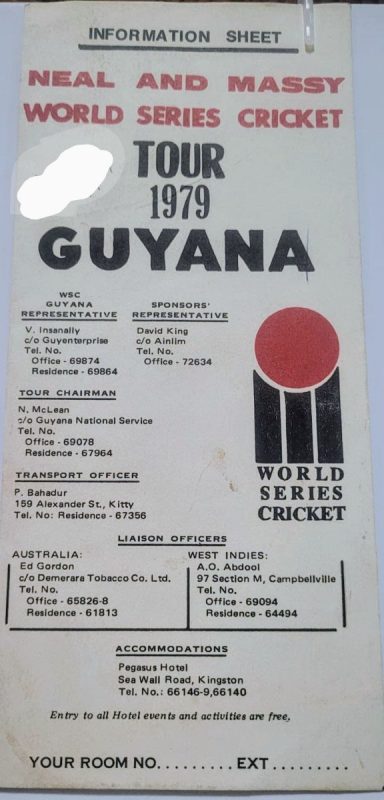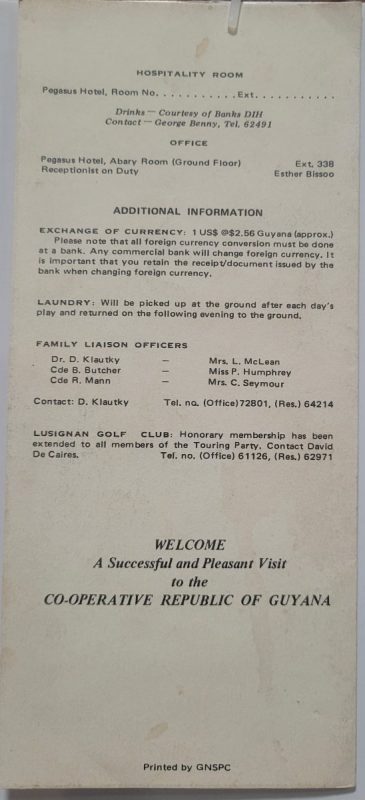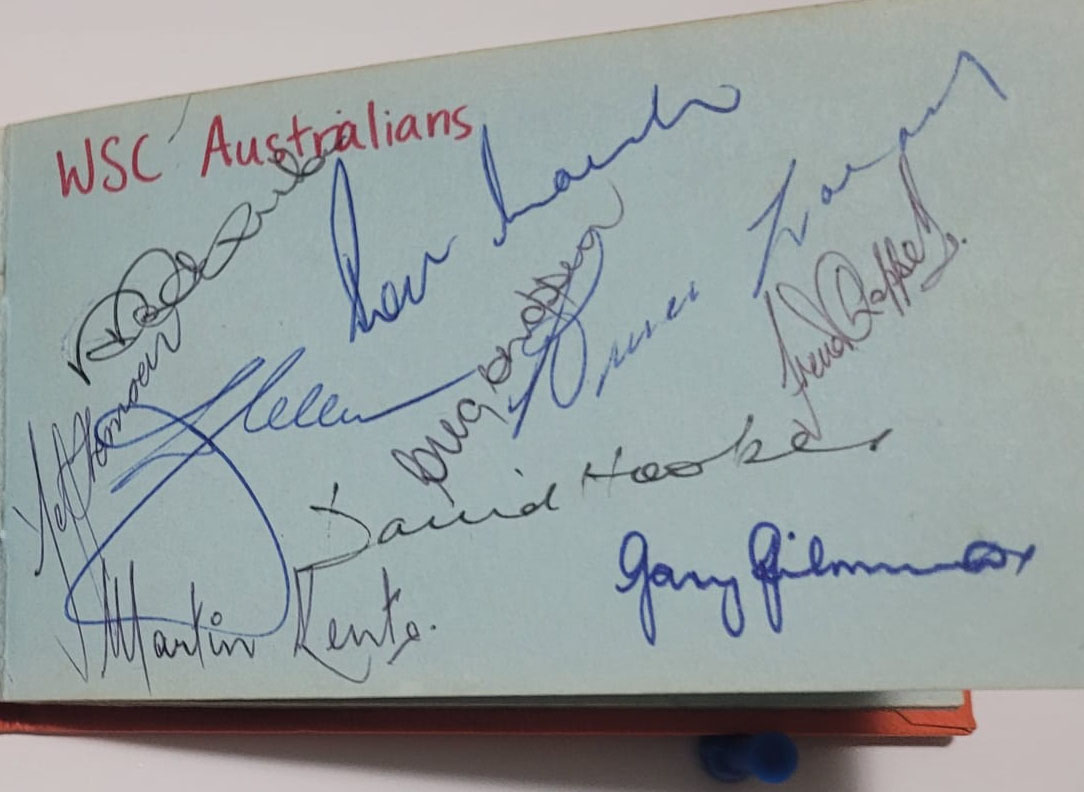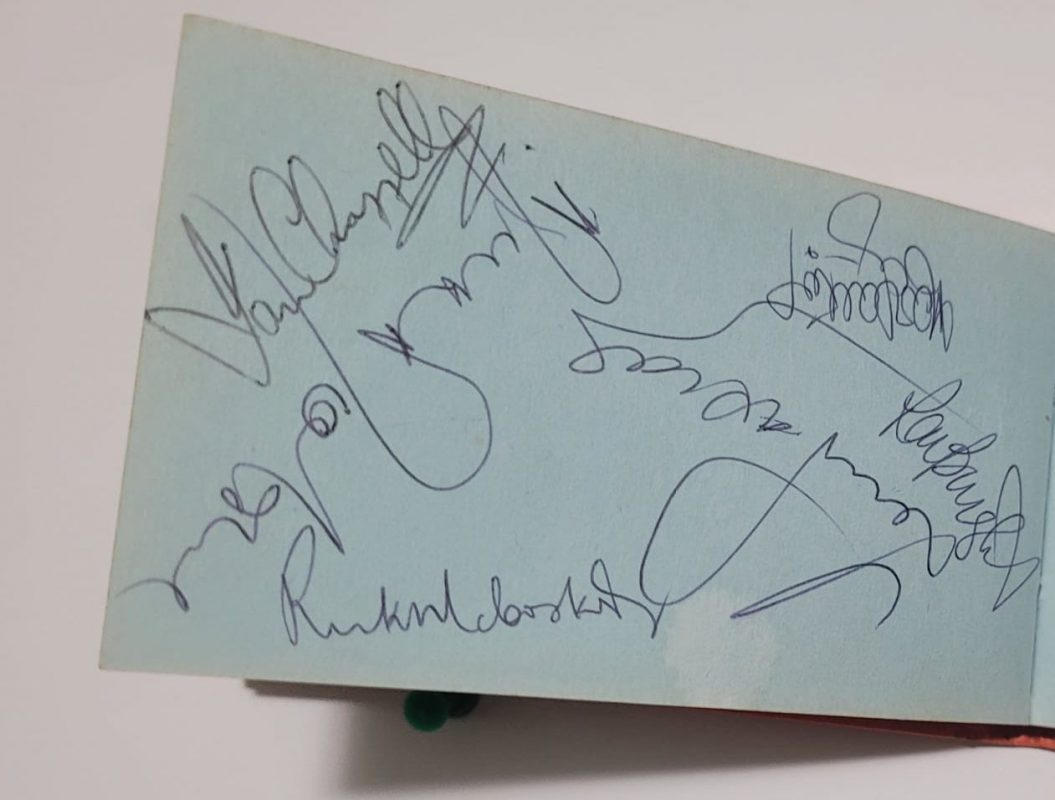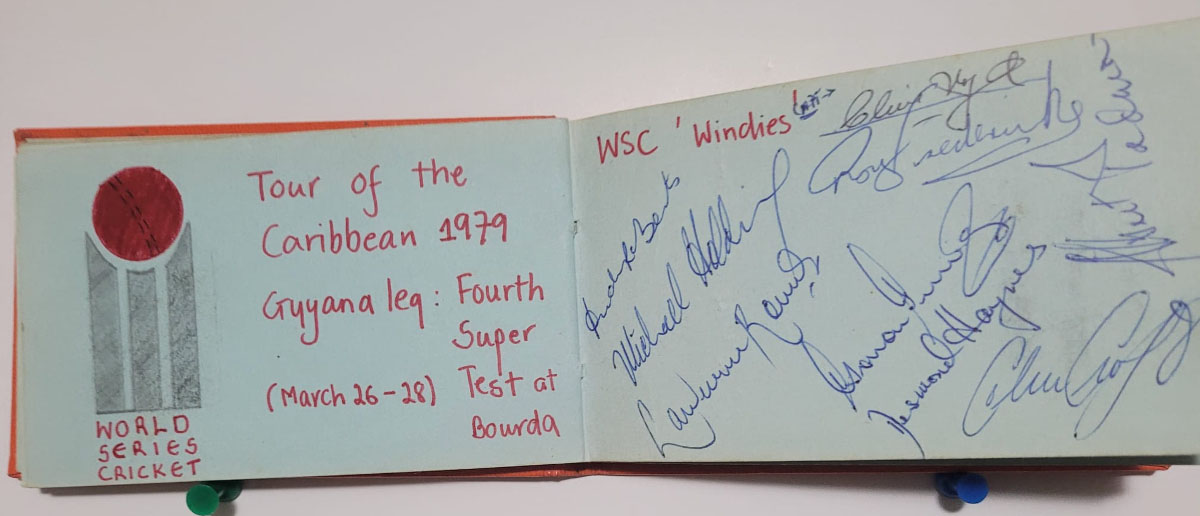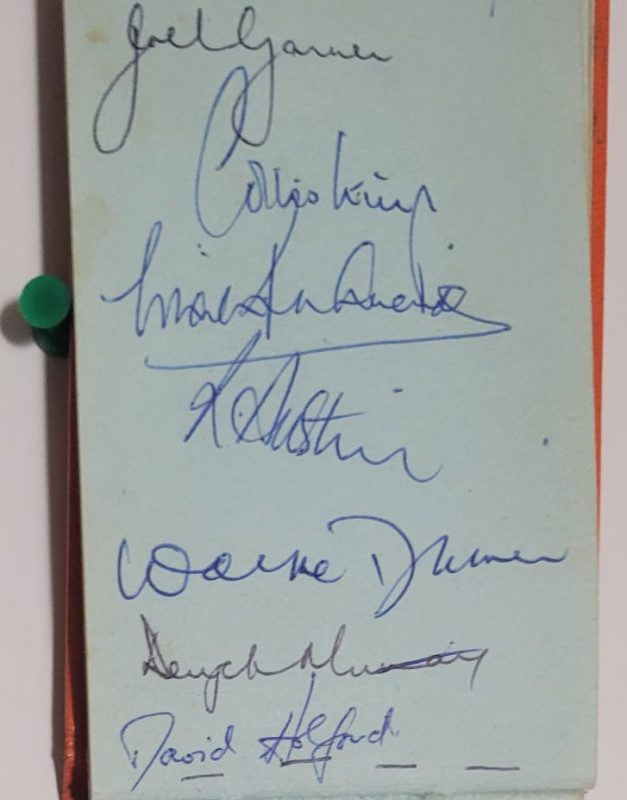In this week’s edition of In Search of West Indies Cricket, the second of two parts, Roger Seymour looks at the matches of the 1979 World Series Cricket Season in the Caribbean.
Prelude
Forty-four years later, the itinerary of the 1979 World Series Cricket (WSC) Tour of the Caribbean reads like the ports of call on a private luxury yacht cruise: Kingston, Jamaica; Castries, St Lucia; Bridgetown, Barbados; Georgetown, Guyana; Port-of-Spain, Trinidad; Roseau, Dominica; St John’s, Antigua and Basseterre, St Kitts. The path of the idle rich winding in the wake of buccaneers of centuries past. Modern age plunderers of time, soaking up the sun’s rays whilst wallowing in sandy coves and cays, basking on moonlight decks, gyrating to rhythmic beats, and sipping rums distilled from formulae of plantations past.
A member of the WSC tour party has a vastly different recollection. One evening, during the Second Test match of the 1994 West Indies/England series, a group was sauntering across the Bourda sward from the old press box (which was located under the radio commentators’ booth at the Regent Road end) after the day’s play, when Colin Croft, the former West Indies fast bowler, then in the early stages of his media career, halted in his tracks and pirouetted to respond to a query. “Let me tell you all something, that World Series Cricket Tour of the Caribbean, was the hardest cricket I ever played,” he said. “In 52 days we played 17 matches. Thirty-seven days of hard cricket. When we weren’t playing we were travelling. We were well paid, but, boy, we earned every penny. It was tough, real tough.”
……………………………………..
An old score to settle
The West Indians failed to qualify for the Grand Supertest Final, after succumbing by an innings and 44 runs to the World XI, and drawing with the Australian XI in the preliminary round, before suffering the humiliation of a ten-wicket defeat in the Supertest Final at Sydney, January 21st – 24th, in which they mustered trifling scores of 163 and 89. However, they quickly regrouped to capture the International Cup Grand Finals at Melbourne, beating the Australians by a 3-1 margin, over four consecutive nights from January 27th to 30th. After losing the first game, the West Indies took three straight, finishing the series with a controversial run rate victory, as their opponents, caught unawares, disappointingly realised that the AUS$35,000 jackpot had vanished.
Just days later, in the Supertest Grand Final, February 2nd – 4th, at Sydney, the WSC World XI ground out a five-wicket victory in a low-scoring game, on the back of South African Barry Richards’ five-hour, epic second innings century, 101 not out. The tough loss saw the WSC Australians miss out on the AUS$61,000 winners’ bonus, another bitter pill to swallow.
The 1979 WSC Australians/WSC West Indians clash was the most anticipated cricket series in the Caribbean in years. There was a major score to settle. The West Indies 1968/69 Tour of Australia, a 3-1 defeat, had put the final nails in the coffin of the great side of the 1960s, a team which had captured the Sir Frank Worrell Trophy at home in 1965, taking the series by a 2-1 margin. The 1973 Australian visitors, led by the hard-nosed Ian ‘Chappelli’ Chappell retained the trophy after winning the series 2-0. The manner of the two losses still rankles older fans to this day. After two drawn Test matches in Jamaica, and Barbados, the West Indies squandered a glorious chance to win the Third Test in Trinidad, and then after leading the Australians on first innings in the Fourth Test at Bourda, inexplicably collapsed (surrendered might be more apt) for 109, leaving the visitors to coast to a ten-wicket victory and an unassailable series lead.
The 5-1 loss suffered ‘Down Under’ in 1975/76 left an indelible mark on West Indian players, in one form or another. The harsh lesson served as the blueprint for the construction of the juggernaut of the late 1970s and the 1980s. It was a baptism of fire for many of the players on their first visit to Australia, as Dennis Lillee, Jeff Thomson, Max Walker and Gary Gilmour terrorised with their lethal fast bowling, peppering the batsmen with a litany of bouncers. The 1978 Australians, a virtual Second XI, devoid of their Packer players, were mercilessly pummeled by the full strength West Indians in the first two Tests (In Search of West Indies Cricket, From peanuts to gravy, SN 27th August, ‘23). Once the WSC players were replaced, the visitors fought back bravely against a side of similar standing in the final three Tests. West Indies fans consider the 3-1 series result a hollow victory, not a true conquering of the Australians.
The 1979 WSC Caribbean Supertest Series would settle the score. It was an opportunity to inflict a stinging defeat on a tough Australian side under the guidance of ‘Chappelli’, who had resigned as captain of the Test side in 1975, after four years, making way for his younger brother, Greg, to become the new skipper. When WSC was inaugurated, Kerry Packer personally anointed ‘Chappelli’ leader of the WSC Australians, over his vehement protests that Greg was the skipper. Years later on Packer’s Channel Nine Network, ‘Chappelli’, recounting his inaugural meeting with the television tycoon, related his reinstatement, “What do you #@$%ing think this is, son, a democracy? I pay the #@$%ing bills, I pick the captain, and you’re the #@$%ing captain.” Packer was very definitive with his decisions.
A few protagonists from the 1973 encounter were still present. In addition to the Chappells, there were, Lillee (who, due to injury, had played only the First Test in ‘73), Rod Marsh (wicketkeeper), Walker, who admirably filled the void left by Lillee that series, and Kerry O’Keefe. Lillee’s other pace demolition partners from the 1975/76 series, Gilmour, and Thomson, who had just been released from his Australian Cricket Board contract, albeit, much short of match practice, were also in the tour party. The rest of the squad included Australian Boy Wonder, David Hookes, Ray Bright, Bruce Laird, Martin Kent, Trevor Chappell, Rick McCosker, and fast bowlers Len Pascoe and Mick Malone.
Captain Clive Lloyd, Roy Fredericks, Lawrence Rowe, and wicketkeeper Deryck Murray were the stalwarts still standing from the 1973 battle. Andy Roberts, Michael Holding, Viv Richards, Gordon Greenidge and Albert Padmore (no Tests), four seasons later, still bore the mental scars of the Down Under thrashing. The balance of the team comprising Wayne Daniel, Collis King, Colin Croft, Joel Garner, Desmond Haynes and Richard Austin had all faced the Aussies during the WSC season(s). High expectations rested on the shoulders of the West Indians. The region was anxious for revenge.
In the Caribbean
Sunday, 18th February, two weeks after the Supertest Grand Final, and one day after arriving from Down Under, the WSC Australians were steeped in a net session at Sabina Park, Kingston, Jamaica, struggling to acclimatise. Two days later, in Match One of the Limited Overs series, at Sabina Park, the visitors could only muster 138 for eight off 40 overs, in reply to the West Indies total of 174. Fredericks, 50, led the way for the home side, whilst Hookes’ 66 was the visitors’ top score. Holding’s four wickets for 22 earned him the Man of the Match (MOM) award. Match Two, the next day, at the same venue, saw the West Indies capitulate from 71 for two, to 132 all out in 36.3 overs, as only the first three batsmen, Austin, Haynes and Fredericks, managed to reach double figures. Apart from Greg Chappell’s 57 and Hookes’ 14, no other Australian passed nine, and it was left to the last pair of Walker and Thomson, who came together at 121, to salvage the win, with nine balls to spare. Thomson claimed the MOM award with five for 31 off 7.3 overs, clipping away the latter half of the batting lineup, before wielding his bat.
First Supertest, 23rd – 26th February, Sabina Park. In the first over after lunch on the fourth day, the West Indies completed the demolition of the Australians, by 369 runs, as the genuinely fast quartet of Roberts, Holding, Croft and Daniel delivered a hostile message. The match hinged around a second innings sixth wicket partnership of 226, at better than a run a minute, between Lloyd, 197, and Roberts, 89, which effectively put the game out of reach. Final scores: West Indies 188, and 481. Australia 106, and 194. MOM: Lloyd 56 and 197. Psychological advantage: West Indies.
Match Three, 3rd March, Victoria Park, Castries, St Lucia. West Indies won by six runs. Scores: West Indies 190 off 42.1 overs; Greenidge, 56, King, 39 not out. Australia, 184 off 43.1 overs; Laird, 56, King, three for 29. MOM: King
Match Four, 4th March, Victoria Park, Castries was abandoned due to rain.
Match Five, 6th March, Kensington Oval, Bridgetown, Barbados. Australia won by 42 runs. Scores: Australia 201 for four off 45 overs; Hookes, 62 not out, Greg Chappell, 60. West Indies, 159 off 39.2 overs; Haynes 59, Richards, 46. MOM: Hookes
Match Six, 7th March, Kensington Oval. West Indies won by seven runs. Scores: West Indies 240 for eight off 45 overs; Richards, 89, Austin, 56. Australia, 233 for seven off 45 overs; Kent, 109. MOM: Kent
Second Supertest, March 9th – 13th, Kensington Oval. Match abandoned as a draw. Scores: Australia, 311, Kent, 78, Ian Chappell, 61, and 294, Ian Chappell, 86, Greg Chappell, 90. West Indies, 239, Fredericks, 89, and 133 for four, Fredericks, 53. The match was marred initially by rain and two bottle throwing incidents, the first of such nature in the history of Kensington Oval. The latter occurred on the final day when Fredericks, in ripping form, was given out LBW, a decision he was not pleased with. The match was abandoned mid-way through the final day, with the West Indies facing the daunting task of batting out the day to save the game.
Third Supertest, March 16th – 20th , Queen’s Park Oval, Port-of-Spain, Trinidad. Australia won by 24 runs. Scores: Australia, 246; Laird, 122, and 282; Greg Chappell, 150. West Indies, 230; Roberts, 50 not out, and 274, Richards, 46. Australia recovered from 32 for five in the first innings to win the match by dint of patience and discipline. Another bottle-throwing incident, when Murray was run out in the WI second innings, threatened to deny the Australians’ chance at victory, but the players stayed on the field, and play resumed after 25 minutes. MOM: Greg Chappell
Fourth Supertest, March 26th – 28th , Bourda, Georgetown, Guyana. Match drawn. Play limited by rain. Scores: Australia, 341; Greg Chappell, 113, Kent, 51, and 117 for three. West Indies, 476; King, 110, Murray, 82, Rowe, 64, Richards, 54, Greenidge, 52. MOM: King
Heavy rainfall in the preceding week caused the start to be shifted from Friday, 23rd March to Sunday, 25th March, when there was the most serious crowd disturbance in the region’s history. That Sunday morning, some 12,000 spectators jammed into Bourda hoping for an early start, as brilliant sunshine basked the lush ground. However, the bowlers’ run-ups were still sodden. As the crowd waited, a lone spectator breached the field, rolled over several times on the wicket and displayed his dry shirt lighting the fuse. The bottle throwing started.
Announcements on the public address system, in an attempt to quell the rioting went unheeded. Fences were pushed over, benches thrown onto the field; the heavy roller was pushed onto the field. The riot was on. The Radio Demerara and the Guyana Broadcasting Service commentary booths and the press box were attacked. The pavilion was stormed, and all the major cricket trophies of British Guiana and Guyana’s past were looted; irreplaceable history gone forever. The players, fearing for their lives, barricaded themselves in the dressing rooms; bottles were thrown at the windows. When the Riot Squad finally arrived and cleared it, the ground was a complete mess. It required the herculean efforts of a platoon from the Guyana National Service working through the night to restore order. It was a dark day for Guyana. It was a dark day for West Indies cricket.
Match Seven, 29th March, Albion, Berbice. West Indies won by six wickets, thus breaking the series streak of the toss winner losing the match. Scores: Australia 209 for seven off 45 overs; McCosker, 89. West Indies 212 for four off 44.2 overs; Greenidge, 95, Richards, 53. MOM: Greenidge
Match Eight, 31st March, Queen’s Park Oval, Trinidad. West Indies won on scoring rate. Scores: West Indies 206 for seven off 45 overs; Richards, 59. Australia, 18 for six off 15 overs; Roberts, four wickets for 7 runs. MOM: Roberts
Match Nine, 1st, April, Queen’s Park Oval. West Indies won by 54 runs. Scores: West Indies 207 for seven off 45 overs; Haynes, 61, Lloyd, 54 not out. Australia, 153 off 36.5 overs; Marsh, 46. MOM: Haynes
Match Ten, 2nd April, Queen’s Park Oval. West Indies won on scoring rate. Scores: Australia 206 for nine off 45 overs; Kent, 61. West Indies, 176 for four, off 26.5 overs. MOM: Greenidge, 73.
Match 11, 4th April, Roseau, Dominica. West Indies won by eight wickets. Australia 137 for nine off 45 overs. West Indies 138 for two, off 37.4 overs; Haynes 50, not out. MOM: Croft, five wickets for 21.
Fifth Supertest, 6th – 10th April, The Recreation Ground, St John’s. The first international match in Antigua: drawn. Rain, as in the three preceding Supertests, disrupted play, leading to the loss of the entire third day. Scores: Australia, 234; Greg Chappell, 104, and 415 for six, Marsh, 102 not out, Greg Chappell, 85, Ian Chappell, 83, Bright, 56 not out. West Indies, 438; Rowe, 135, Murray, 74, Greenidge, 58. MOM: Greg Chappell. Rain and an unbroken seventh wicket partnership of 151 between Marsh and Bright denied the hosts any chance of a victory. Series tied 1–1.
Match 12, 12th April, Warner Park, Basseterre, St Kitts. Rain. Match abandoned.
West Indies win the Limited Overs Matches 8-2.
Greg Chappell, with three consecutive centuries, a streak only curtailed by a run out in the second innings of the last match, won the Man of the Series award. His aggregate was 620 runs and he averaged 68.88 per innings in nine outings. This performance was quite remarkable when one considers that he was forced to miss the Supertest Grand Final after he was diagnosed with Bell’s palsy on the right side of his face, and his place on the trip was only confirmed the day before the team departed.
It was a brutal series for many of the West Indians, who also had English County contracts and were now playing cricket around the clock. There had been no rest days during the Supertests, and the constant travelling by bus and airplanes, packing bags and cricket coffins, checking in and out of hotels, and the early starts had taken a toll on the players by the end of the tour. In contrast, Chappelli’s 1973 side’s schedule consisted of five Test matches inclusive of a rest day, and 21 days of first class cricket against the territorial sides, much weaker opposition, spread over 90-odd days.
The drawn series was a major disappointment for the West Indies fans seeking revenge. The rain, the embarrassing riots and the high price of the tickets only added to their frustration. Whispers of match fixing bubbled for a while as the first four limited overs games produced alternating winners, but were quickly put to bed, once the West Indies reeled off six consecutive wins.
The WSC Caribbean Tour attracted a level of sponsorship completely unheard of for cricket tours of the region. The Trinidad and Tobago-based conglomerate, Neal and Massy Group of Companies had stumped up the magnanimous sum of US$250,000 in overall sponsorship. This largesse covered the series itself, and the related coaching programme undertaken simultaneously in every territory by the West Indies Test legends Sir Garry Sobers, Wes Hall and Lance Gibbs.
The West Indies Tobacco Company disbursed cheques of US$7,200 to the winning team of each Supertest, and amounts of US$1,000 to the winners of the one day limited over matches. Ovaltine donated US$2,000 for the Man of the Series Award, while a host of companies, including Red Stripe, Heineken, and WOT Sports, sponsored the MOM Awards, worth US$500 for the Supertest, and US$250 for the one day games. The total prize pool was US$55,550. Accompanying this new sponsorship was a high degree of planning and execution of the tour details.
The old score still had not been settled, but cricket as a bonafide profession had arrived in the Caribbean.
